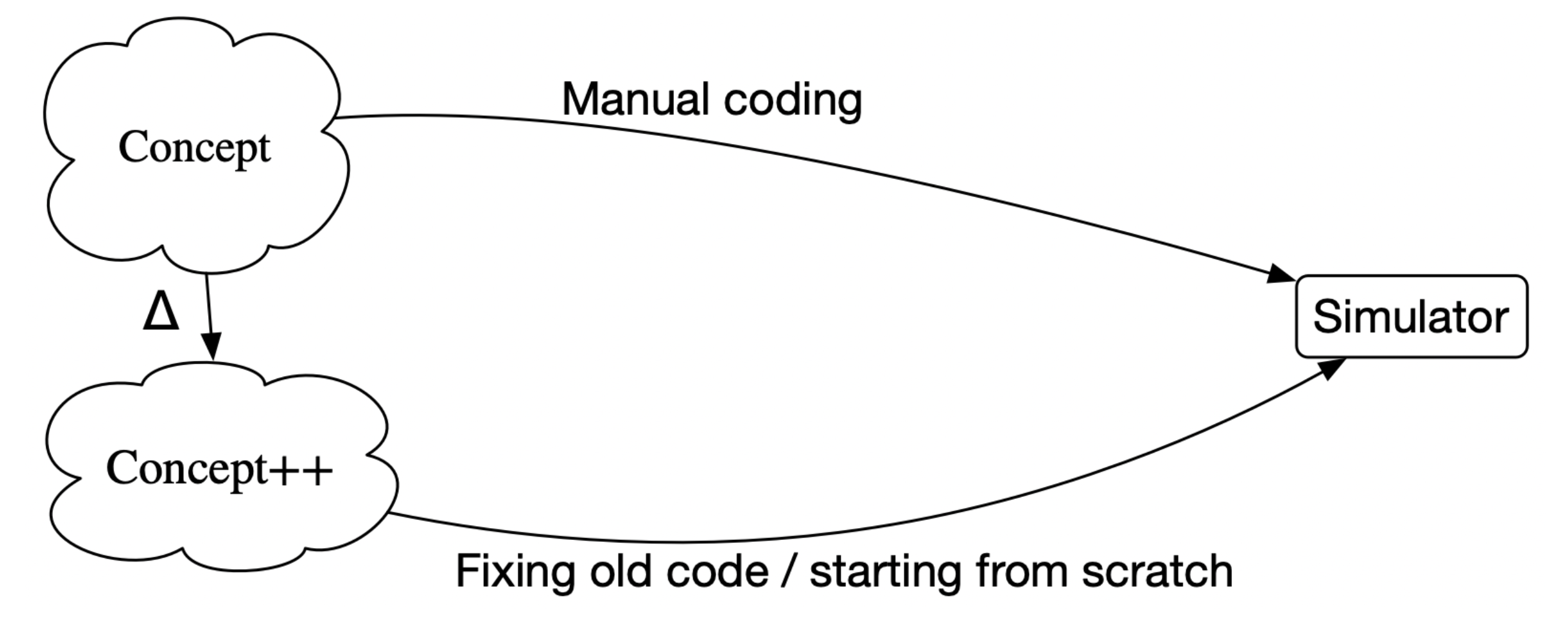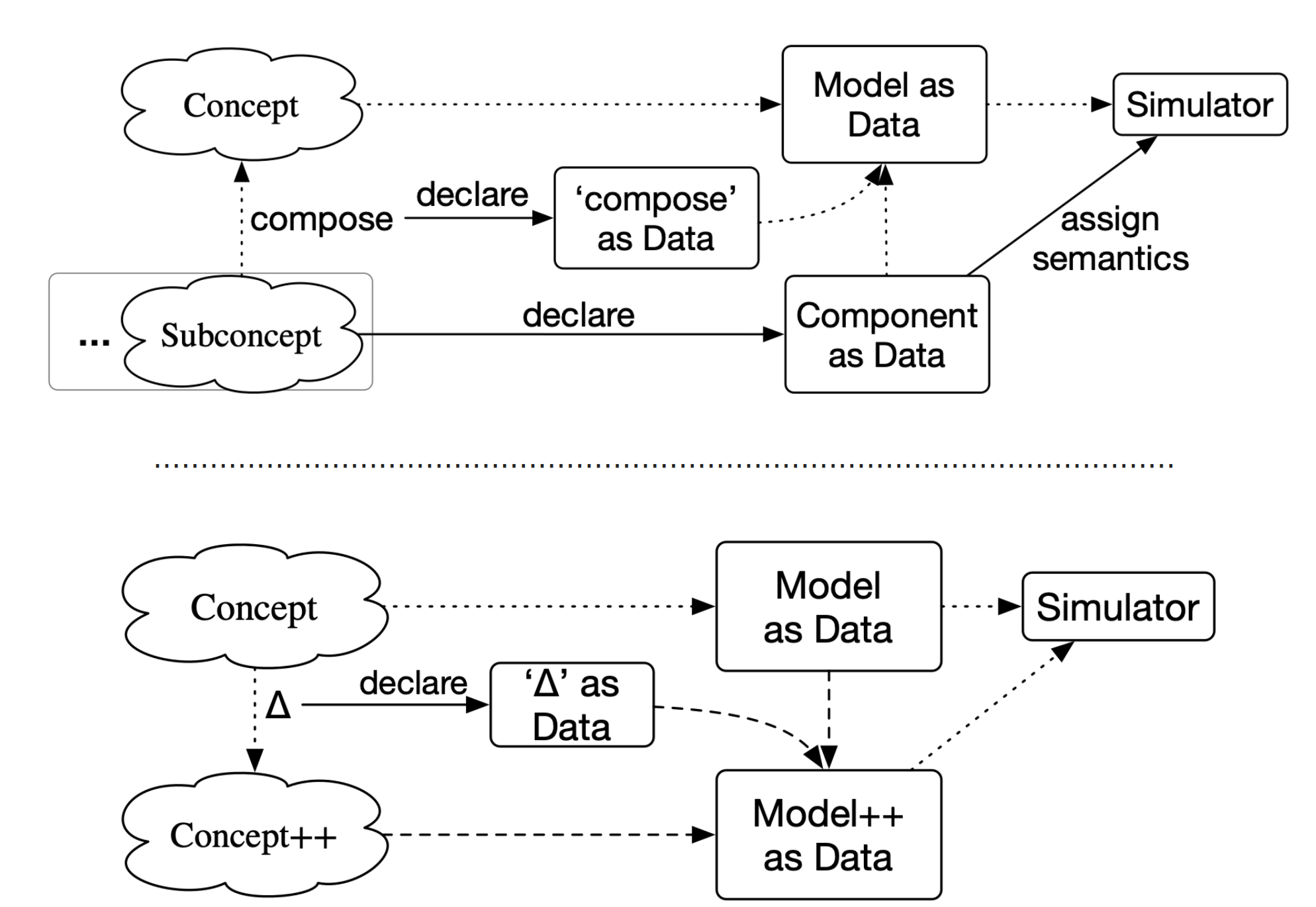Rapid iteration
In software development
2023-11-29
Introduction
-
Idea
- Works in category theory
- Functorial semantics
- One syntax, many semantics
-
Proposal
- Implement in Typescript
- With code generators as functors
What is rapid iteration?
- What is iteration?
- How an iteration becomes rapid?
Iteration
-
Iteration = Changing = Rewriting = Refactoring
- Add, remove, rewrite a feature
- Change a 3rd party provider
- Fix a complex bug, etc.
-
Writers rewrite a novel around 10 times
1
- To achieve a canonical, stable form
- Perhaps software needs the same treatment
Refactoring 1
Example iteration
For an e-commerce store
- Launch MVP
- Change the authorization provider
- Add sorting, filtering to products
Rapid iteration
-
Launch MVP
- Prebuild the app from existing components
-
Change the authorization provider
- Have a generic authorization interface
- Adapt the new provider to the interface
- Write no more code
-
Add sorting, filtering to products
- Have a list component
- Which already has sorting, filtering built in
- You just need to enable these features
Is rapid iteration possible?
-
Tried for ~20 years, with no success
- Using classic programming languages
- And paradigms
-
Tedious manual work
- Abandoned the idea, as impossible
- Did slow, manual refactoring
- Then found Category Theory
Category theory 1
- How to design abstractions
- Which compose well (the natural way)
- Yet remain extensible (iterable)
Category theory 1
- It’s complex …
- But the basics are simple
- There are categories
- And functors
Category
-
Deals with objects and their relationships
- Objects: X, Y, Z
- Morphisms: f, g
- Composition of morphisms: ∘
-
Based on certain axioms:
- Identity: 1b ∘ f = f = f ∘ 1a
- Associativity: h ∘ (g ∘ f) = (h ∘ g) ∘ f
- Identity: 1b ∘ f = f = f ∘ 1a
Categories are everywhere
| Category theory |
Software module |
Algebraic structure 1 |
Concept-based design 2 |
|---|---|---|---|
| Objects | Types, data structures | Domain | Generic types |
| Morphism | Functions | Operations | Actions |
| Axioms | Tests | Axioms | Operational principles |
Concept as category 1

Functors
- They are not everywhere
- As far as I know
Functor 1
- A mapping between categories
-
Associates each
- Object
- Morphism
- From a category to another
- Preserves the axioms


Functorial semantics 1
“One syntax, many semantics”
- Category = Syntax
- Functor 1 = Semantics 1
- Functor 2 = Semantics 2
- Functor n = Semantics n
Applied Category Theory / AlgebraicJulia
-
There is a main category
- Describes the problem
- This is the syntax
-
There are additional categories
-
They add computational content, like
- Execution, verification, visualization
- These are the semantics
-
They add computational content, like
-
Functors
- Auto-map the main category
- To the additional categories
Rapid iteration with category theory
- It’s very, very easy
- Watch the functors !!!
-
In the following diagrams:
-
A dotted arrow
- Is a functor
- Is an automatic task
- Performed by the system
- In the background
-
A standard arrow
- Is a manual task
- Performed by the developer
-
A dotted arrow
\[\begin{gather*} \dashrightarrow\text{Automatic / Functor}\\ \rightarrow\text{Manual task} \end{gather*}\]
Manual iteration 1
All tasks are manual

Rapid iteration 1
Just a few manual tasks …

Manual vs. rapid iteration example

Python, classical, Write code
"""Migrate a Sim to a Sim2"""
def migrate_sim(sim::Sim):
init_sys = System2(sim.cell, sim.atoms)
final_sys = unknown(init_sys.cell.pbc)
return Sim2(sim.calc, init_sys, final_sys)
for old_sim in get_sims(old_db_cxn):
insert_sim(migrate_sim(old_sim), new_db_cxn)
new_query = "SELECT S1.pth, S2.pth FROM ..."Algebraic Julia, categorical, Declare the change
In Category theory / Algebraic Julia
-
There are very few manual tasks
- Only declarations
- Of components, compositions, changes
- Initial values, input props
-
There are lots of automatic tasks
- Executed instantly
- In the background
- By the system / functors
In Category theory / Algebraic Julia
-
The focus is on
- Conceptual understanding
- Modelling the world
- Creating / declaring categories
-
All the rest …
- Like execution, verification, visualization
- Is handled by functors
- In an automatic way
Category theory / Algebraic Julia
- Academic software
- Not ready for the industry yet
Is rapid iteration possible without ACT?
-
Formal methods 1
- Yes, model is math
- Expensive ❌
- Not for everyday software
-
Semi-formal methods ❓
- Maybe, model is semi-data (DSL)
- Affordable
-
Informal methods ❌
- No, model is code
How to replicate rapid iterations from ACT?
-
First we need a category
- Or something similar
- Generic, interface-like, with declarative syntax
-
Then a functor
- Which transforms the interface
- Into an implementation
- “It gives a computational meaning, content”
-
Therefore a rapid iteration is:
- Declare the changes in the interface
- (Re)run the functor
Example
An algebraic structure in Typescript ready for rapid iteration
The List algebraic structure
- It’s a generic interface / type
- Equipped with a rapid iteration operation
- Which is a code generator
type List[T] {
domain: {
items: T[]
currentItem: T
}
operations: {
// The rapid iteration operation
generateListImplementation: (config) => {...}
// List specific operations
addItem: () => {...}
removeItem:() => {...}
sortItems: () => {...}
filterItems: () => {...}
...
}
axioms: {
whenAddItem: "The created item becomes the currentItem"
...
}
}The code generator
- Keeps the model / interface intact
- Implements the model
-
Based on configuration, options
- Declare the changes
Usage
- You can generate on the fly …
- … different implementations of the same interface
The result
- The code generator
- Implements the models
- Into
/app
Example iteration
-
Just update the config
- Declare the changes
- And run again the generator
Iteration 0
generateListImplementation(
{
name: "Articles",
operations: ['list', 'click', 'addItem', 'removeItem', ...]
formLibrary: "uniforms"
}Iteration 1
The result of an iteration
- The new implementation of the model
-
The old implementation is kept for
- History
- Manual merge, if needed
Summary
-
Rapid iteration is possible
- With a new technique
- Inspired by Applied Category Theory
-
The problem, the model, the concept
- Is a generic interface
- Has a declarative syntax
- Changes, iterations go here
-
The solution
- Implements an interface
- Automatically, via a code generator
- Doesn’t cares about changes, iterations